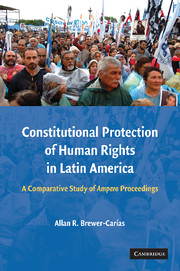 Constitutional Protection of Human Rights in Latin America
Constitutional Protection of Human Rights in Latin America Book contents
- Frontmatter
- Contents
- INTRODUCTION
- PART ONE THE CONSTITUTIONAL AND INTERNATIONAL DECLARATION OF HUMAN RIGHTS AND ITS JUDICIAL GUARANTIES
- PART TWO THE AMPARO AS A LATIN AMERICAN CONSTITUTIONAL AND INTERNATIONAL LAW INSTITUTION
- PART THREE THE INJURED PARTY AND THE CONSTITUTIONAL RIGHTS PROTECTED BY MEANS OF THE AMPARO PROCEEDING
- PART FOUR THE INJURY, THE INJURING PARTY AND THE INJURING ACTS OR OMISSIONS IN THE AMPARO PROCEEDING
- PART FIVE THE EXTRAORDINARY CHARACTER OF THE AMPARO PROCEEDING
- CONCLUSION
- APPENDIX A List of Latin American Constitutions
- APPENDIX B List of Latin American Amparo Laws (Statutes)
- INDEX
PART FIVE - THE EXTRAORDINARY CHARACTER OF THE AMPARO PROCEEDING
Published online by Cambridge University Press: 08 August 2009
- Frontmatter
- Contents
- INTRODUCTION
- PART ONE THE CONSTITUTIONAL AND INTERNATIONAL DECLARATION OF HUMAN RIGHTS AND ITS JUDICIAL GUARANTIES
- PART TWO THE AMPARO AS A LATIN AMERICAN CONSTITUTIONAL AND INTERNATIONAL LAW INSTITUTION
- PART THREE THE INJURED PARTY AND THE CONSTITUTIONAL RIGHTS PROTECTED BY MEANS OF THE AMPARO PROCEEDING
- PART FOUR THE INJURY, THE INJURING PARTY AND THE INJURING ACTS OR OMISSIONS IN THE AMPARO PROCEEDING
- PART FIVE THE EXTRAORDINARY CHARACTER OF THE AMPARO PROCEEDING
- CONCLUSION
- APPENDIX A List of Latin American Constitutions
- APPENDIX B List of Latin American Amparo Laws (Statutes)
- INDEX
Summary
Being a judicial means specifically established for the protection of constitutional rights, the amparo action is conceived of in Latin America as an extraordinary instrument that, consequently, does not substitute for all the other ordinary judicial remedies established for the protection of personal rights and interest. This implies that the amparo action, as a matter of principle, only can be filed when no other adequate judicial mean exists and is available in order to obtain the immediate protection of the violated constitutional rights.
The main consequence of this extraordinary character of the amparo proceeding has been the development of a series of specific procedure rules imposed by the need to grant immediate protection to constitutional rights, that in many cases are different from the general rules that govern the ordinary judicial procedures, particularly when that protection cannot be obtained through the ordinary judicial means.
The first group of these procedural rules, as mentioned, refers to the admissibility of the action, established in order to determine the existence or inexistence of other adequate judicial mean for the immediate protection of the rights, which justifies or not the use of the extraordinary action. The second group of the rules refers to the main principles that govern the amparo proceeding as an extraordinary one, giving it its adjective specificity. The third group of the rules refers to the specific configuration of the basic phases of the procedure in the amparo action, originated, precisely, because of the same extraordinary character of the proceeding.
- Type
- Chapter
- Information
- Constitutional Protection of Human Rights in Latin AmericaA Comparative Study of Amparo Proceedings, pp. 329 - 330Publisher: Cambridge University PressPrint publication year: 2008
- 1
- Cited by


